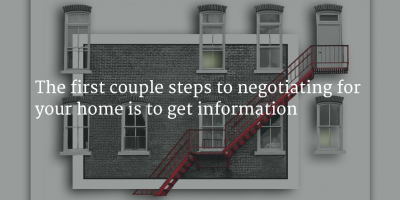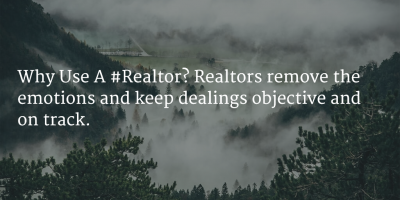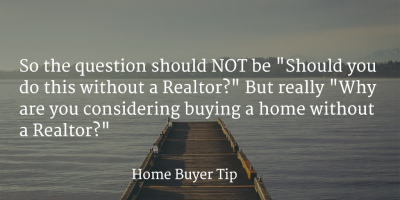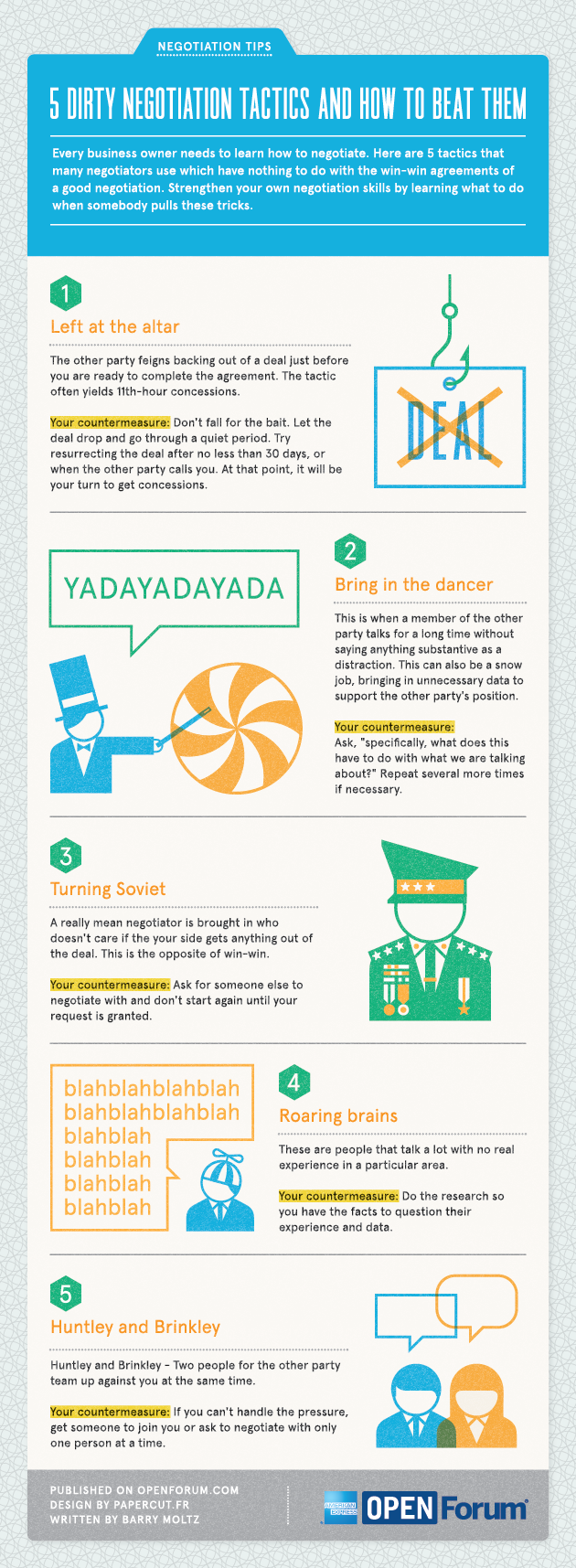Negotiating For Your Home | Home Buyers Tips
The first couple steps to negotiating for your home is to get information.

#1 You need to determine if it is a "Buyer's Market" or Seller's Market".

In a "Buyer's Market" you are more likely to get a deal and be able to do some real great negotiations.
In a "Seller's Market" homes are going to be selling close to list price. (If the list price close to it's real market value.)
So how do you determine the market value?

Ask your Realtor. They will pull the market history for the past 6 months.
- How many homes have sold in the past 6 months?
- Divide this number by 6.
- How many homes on the market now?
- Divide the number of homes on the market now by the figure from #2.
Your result is the "Absorption Rate".
A balance market is 6. This means 6 months to sell everything on the market at the current rent of sales. Below 6 months and you have a "Buyer's Market". Above 6 months and you have a "Seller's Market".
It smart to get Absorption Rate at a micro and macro level. Meaning you can do it for the neighborhood and for the general area or zip code. This way you can get a picture of this neighborhood as compared to the area and make sure you are not missing a trend. Are the neighborhood absorption rate and area absorption rate are significantly different? You have just caught an upcoming change in the market!
#2 You need to determine the home's real market value
How do you do this? Ask your Realtor for the "comps". This is short for the comparable homes.
They will provide you with the:
- Actives
- Pending
- Sold
- Expired
In the best case scenario these homes will be:
- On the same street or close by in the neighborhood.
- Within 10 years of being built of the home you are interested in.
- These homes will also be within 10% of the square footage of the home you are interested in.
- These homes will have similar lots & views. Weed out the homes on the busy streets or without a view unless that is similar.
- These homes will have similar features. If the home you are looking at has a pool. Then your comps should have pools. Or vice versa. Another important feature in our area is a 3 car garage.
Actives are the homes on the market. You should have looked at these homes.

Prices of these homes don't matter to your offer unless there is a comparable home at a better price. If so, then you let the listing agent know that your 2nd choice is lower priced. But you wanted to give them (your first choice) a chance before you move on to your second choice. (FYI This doesn't work in a Seller's Market). Worst case scenario is you make them justify their higher price.
Pending homes are homes under contract.

These are important. Look to see if these homes have only been on the market for a short time. If so that means you have are in or coming into a "Seller's Market". If these prices are way above the sold prices then it also indicates prices are rising.
Sold homes are your gauge of market value.
This is because the sold homes are what you appraiser will be using. Thus your offer price shouldn't exceed the sold home value range. If it is and you are getting financing or have an appraisal contingency then the offer won't go through.
To get a more exact market value your examination of the sold homes should be detailed:
- You want to look at the most recent sale.
- You want to weed out the foreclosures and short sales (unless that is the true market). We can add them back in for presentation with the offer.
- You want to look at the upgrades. Again weed out ones that don't match the home you are interested in.
Then you want to see if these home sold quickly? This is another sign of a seller's market.
What is the percentage of sold price to list price? Our normal market is around 97%. But, in really hot markets this can be 99% or even over 100%! You can also use this to gauge what the seller expects to end up at.
Now adjust for any difference you can't weed out. This will give a range for the market value of the home.

#3 If possible you want to find out why the seller is selling.

Is there real motivation to sell here?
You know the seller wants to sell. After all, they went through the hassle of putting their home on the market. But how badly do they want to sell?
If there is one of the following factors present then chances are you will get a better deal:
- divorce
- relocation
- money issues
The second step is to make the initial offer
First find out, Is there another offer in the works?

Your agent should of reached out to the listing agent as soon as you indicated interest. They would of been checking to see:
- If anybody else is interested in the property?
- Coming back for a 2nd or 3rd look?
- Said they were writing an offer?
This way you know if your are in competition before you submit your offer. Negotiating tactics are way different if you are in a multiple offer situation.
Make the Offer Easy to Accept

The simple truth is the seller will not accept your first offer. Everyone expects to negotiate for the home. So it is smart to put in some "throw away items" in the offer and ask for more than you expect.
At the same time putting in a low ball offer or excessive contingencies will scare the seller off.
How do you make an "easy to accept" offer?
- Focus on your priorities
- Add in a home warranty. The seller can remove it and feel like they achieve a good negotiation.
- Only use essential contingencies if possible: financing, appraisal and inspection.
- No excessive time frames
- A letter to the seller. While some may disagree ... Developing a good emotional connection with the home seller may have it's benefits.
- Pre-Approval Letter. Not a pre-qualification letter. A real pre-approval letter.
Then prepare for the back and forth.
This Isn't Business. It's Personal...
Now if you negotiate in your business everyday please remember this is different. You are not dealing with another business person.
Please realize you are dealing with a regular person that might sell a home every 7 to 12 years. This is there home. Where they might of raised their kids or last lived with a lost parent. For the seller there will always be some emotions involved.
So whereas in business a low ball offer would be seen as a starting position. The seller will see the low ball offer as an insult.
The Realtors will do their best to remove the emotions and keep dealings objective. This is one of the best ways to keep the deal on track.

What to Ask For
Review the information you have gathered and make the offer.
Important parts of the offer:
- Purchase Price
- Binder Amount
- Financing Contingency
- Appraisal Contingency
- Closing Cost
- Closing Date
- Inspection Time Frame
- Personal Property Included
- Expiration Date of Offer
How to Respond to Seller's Counter Offer
First you should always respond. Remember don't take it personal.
Ask questions. If you can find the reason behind the Seller then you may be able to come up with a workable solution.
Your response should be based on facts.

Countering the Price

There 3 ways to counter the Seller's Price:
- Sales Comps
- Limit on Pre-Qualification Amount
- Appraisal Contingency
- Cost of Repairs
Sales Comps
This is where most negotiations end up. We have our sales comps that we are basing our value on. They might have their sales comps they are basing their value on.
Can you change their perception of their comps? Can you find a valid reason for ruling them out? Can you provide a reason why your comps are more valid?
Initial negotiations will focus on the market analysis. Later negotiations will move off from this focus. This is because later negotiations will get closer to you and the seller's bottom line. And the bottom line is not always based on the market analysis. But often on your and the seller's gut feelings.
Limit on Pre-Qualification Amount
This is good as a last resort. You tell the seller you love their home but you can't get a bigger mortgage. So the seller can:
- They can put their home back on the market. And wait and see if another offer will come along. Another offer that may not have as good of terms.
- Or they can accept your offer. Your offer may have a quick closing or no repair clause. You want to persuade the seller that your offer is as close to a "sure thing" as they can get.
Appraisal Contingency
If the seller can't provide valid comps then this is a great argument.
Why put forth an offer that won't appraise? You can't get financing for the home if it doesn't appraise. Make sure the seller knows this.
Sometimes when the seller finds out it is not you who is saying "NO" but your lender they will move forward.
Cost of Repairs
This is a harder concept to work with the seller. What you might consider a "repair" might be seen as an "update" by the seller. And one that is not necessary.
Bring in the comps to show how the other homes sold higher when they had the "repair". You might be able to convince the seller that a lower price is valid.
More Tips For Home Shopping & Getting Your Offer Accepted
- Get Pre-approved - Ok. I know I already mentioned this. But it is that important to mention again. Especially if you are in a hot market. In hot markets sellers won't even consider offers without pre-approval letters.

- Know how much an extra $1,000 will cost you per month - If you are financing the home an extra thousand dollars may only cost you $5/mo - $8/mo extra on your mortgage. So the final price of the home may not be as important to you as a closing cost credit or other term. Who wouldn't cut their Netflix account to afford the home of their dreams?
- Know when you want to close - Knowing when you want to close and having back up plans will let you respond quickly. What would the cost and ramifications of closing 2 weeks early? Is that even possible.. Or is closing a month later possible? Knowing these facts and the cost of each will enable you to negotiate with power.
- Negotiate off of the facts. Present the data. - Keep negative emotions out of it. Base offers off of the data and blame your mortgage company. Let them know you do love the house but financially the deal will only work one way.
- Make a quick decision - In anything but a "Buyer's Market" if you just saw a house you liked then act. Don't take a couple days to think about it. Chances are someone looked at the home yesterday and is submitting an offer today. So if you wait until tomorrow you will be a day late.
- Decide if you want to be in a multiple bid situation - Negotiating tactics are different in a multiple bid situation. It's not how much below list price you are going to get the home. It is often how much above list price. Some people object to this in principal. Decide if you are one of them and let your Realtor know. (In hot markets you won't have choice).
- Don't try to get yours back in inspection repair request - Don't agree to a price higher than you want and expect to get your back in the inspection request. There is nothing wrong with requesting repairs. This is normal. But excessive request usually sink the deal and waste everyone's time.

- The "Fat Lady Singing" is When You Get It In Writing & Signed - No matter what one party told the other. What is written and signed off by all parties is what is agreed to. Period.
- The perfect house doesn't exist. There are definite requirements you should have for you new home. But if you can't find what you want, in the price range you want ... Then you need to change what you want or your price range. Square footage, bedroom, bathroom, garage, etc. are all items that are expensive to change in the house. Start with these as a priority and have the steam shower as something you can add in the future.
- Terms can be almost as important as price. Price is important. But there can be terms that can save you in price. Having the Seller do a buy-down or pay a point on your mortgage can save you more in the long run.
- Appeal to the seller with a note. Sometimes money isn't everything. If you can connect with the Seller then they may be more open to you.
Should you do this without a Realtor?
It's possible to do this without a Realtor. But a Realtor makes it easier to:
- get market value for the home
- gather the information
- give an objective opinion
- tell you what is normal in the transaction.
- Furthermore, it's free to you.
So the question should NOT be "Should you do this without a Realtor?" But really "Why are you considering buying a home without a Realtor?"

5 Dirty Negotiation Tricks and How to Beat Them

